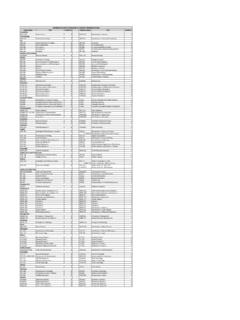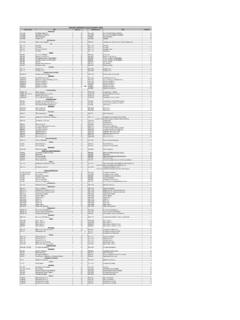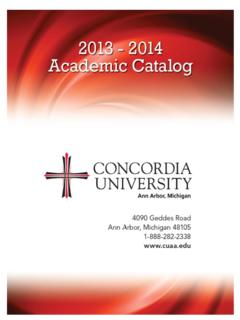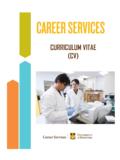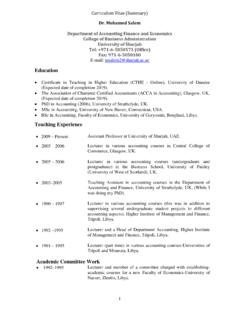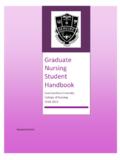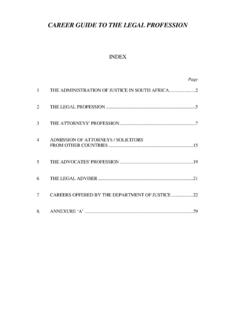Transcription of Accelerated Learning Centers and Off Campus Offerings
1 Appleton Beloit Green BAyKenoshA MAdison MequonMilwAuKee Midtown Miller pArK wAyst. louis wAuKeshAConcordia University Wisconsin is accredited by the Higher Learning view an interactive version of this catalog, scan the qr code below with your smartphone, or visit to view both interactive and pdF versions of all of our academic catalogsAccelerated Learning Centers and Off Campus OfferingsConcordia university wisconsin - Accelerated Learning Centers and off Campus offerings12800 N. Lake Shore Drive Mequon, WI 53097-2402T: (262) F: (262) University Accelerated Learning Centers and Off Campus Offerings1 Concordia University 2012- 2013 Academic CatalogTable of ContentsI.
2 Introduction ..3-4 Mission StatementStudent Learning OutcomesUniversity Wide OutcomesStatement of PurposeAccreditationII. Accelerated Learning Center Program Information ..5-9 Admissions ProceduresE- Learning Transfer CreditsNon-Traditional Approaches to Earning CreditIII. Academic Requirements ..9-11 GradingIncompletes Academic Grievance ProcedureAbsences and Tardiness Dropping a Class Withdrawal from the ProgramE- Learning Refund PolicyGraduation Career ServicesIV. Financial Aid ..11-12A. Student Financial ResponsibilitiesB. Student Grants / LoansC. Veterans BenefitsD. Employee ReimbursementV. Student Academic Support Services ..13VI. Student Support Services ..14 VII.
3 Additional Accelerated Learning Center Information ..14-172 Concordia University Accelerated Learning Centers and Off Campus OfferingsVIII. undergraduate Program Majors ..18-44A. Medical Assistant / MA Course DescriptionsB. Bachelor Degree Core Curriculum StandardsC. AccountingD. Business ManagementE. Health Care ManagementF. Human ResourcesF. Liberal ArtsG. Management of Criminal JusticeH. Nursing (RN BSN Completion) H. Theological StudiesE. Minors and Certificates F. undergraduate Course DescriptionsIX. Graduate Program Majors .. 45-67A. Business AdministrationConcentrationsCourse DescriptionsB. EducationMaster Degree Concentration Areas:Teacher CertificationCounselingCurriculum and InstructionEducation AdministrationReadingCourse DescriptionsX.
4 Accelerated Learning Centers and other Locations ..68-73XI. Faculty ..74-84 Concordia University Wisconsin admits qualified students of any age, sex, race, color, national or ethnic origin, physical or mental conditions, or developmental disability, to all the rights, privileges, programs, and activities generally accorded or made available to students at the school. Concordia University Wisconsin does not discriminate on the basis of race, color, national or ethnic origin, age, sex, physical or mental condition, or developmental disability in the administration of its admission policies, education policies, scholarship and loan programs, athletic and extra-curricular programs or other school-administered University does not discriminate on the basis of handicap.
5 ( Section 504 of the Rehabilitation Act of 1973). Concordia University 2012- 2013 Academic CatalogConcordia University Accelerated Learning Centers and Off Campus Offerings3 Concordia University Wisconsin Mission stateMentConcordia University Wisconsin is a Lutheran higher education community committed to helping students develop in mind, body, and spirit for service to Christ in the Church and the Learning outcoMesConcordia s student Learning outcomes reflect the knowledge, skills, attitudes, competencies, and habits of mind that our students are expected to acquire. These outcomes highlight student Learning at three levels: the overall university level, the department/major level; the core curriculum program level.
6 Concordia s student Learning outcomes flow from our mission of helping students develop in mind, body and spirit in service to Christ in the Church and in the Wide outcoMesConcordia University Wisconsin students will apply a biblical understanding of the world that includes truth, vocation, ethical principles, and servant leadership as they: demonstrate habits of the mind, body, and spirit that are rooted in an understanding of the liberal arts (Liberal Arts); demonstrate the ability to analyze and apply their discipline s theoretical, methodological, ethical, and practical foundations (Disciplinary Thinking); and demonstrate a readiness to embrace their opportunities and obligations as citizens in a complex world (Global Citizenship).
7 4 Concordia University Accelerated Learning Centers and Off Campus OfferingsAccelerated Learning Centers and Off Campus OfferingsstateMent of PurPoseConcordia University s Centers are charged with carrying the mission of the University to the non-traditional adult student. Like the traditional degree programs, the programs offered at our Centers are founded in the Christian Liberal Arts tradition of the , the program is very much tailored to the needs and unique capabilities of the mature adult learner. For instance, classes are offered at locations near students homes or work. Classes are offered in an Accelerated evening format with most classes meeting once per week with our enhanced online component course design.
8 This designed was developed with adult Learning methodology in mind to encourage the most beneficial Learning environment. In addition, students can earn credit in a variety of modalities from the traditional classroom setting to college level Learning experiences obtained through their career or even Accelerated Learning Center student and the traditional post high school age student differ in that the former has benefited from years of life experience and then sought the academic education, while the traditional student first receives the education and then the life experience. Thus, the needs of the mature adult learner are different; socialization, for instance, plays a much greater role in the academic life of the traditional student and, indeed, accounts for much of the necessity for extended contact hours.
9 The mature adult learners, on the other hand, are interested in cutting right to the essence of a topic and are capable of processing greater amounts of material over much shorter periods of are often asked what the difference is between Concordia s programs and those of other Accelerated degree programs. We are also asked how we get as much accomplished in a six week schedule as one does in a traditional semester. The programs offered at our Accelerated Learning Centers are not just an Accelerated version of a traditional semester, they are more like an instructor facilitated, practitioner based format which includes a number of hours of classroom experience. It is expected and required that the much of the Learning will occur outside the classroom through more of a directed independent hallmark of the mature adult education degree programs is a strong emphasis on the direct applicability of the course material to the students careers.
10 Our majors accomplish this admirably. In addition, and this is the key difference, our entire program is infused with the liberal arts conveyed in a Lutheran Christian goal for our mature adult learners is personal development. The University has identified six competencies or areas in which this should occur: aesthetic sensibilities, communication skills, cultural understanding, numeracy, problem solving, physical development, spiritual development, scientific literacy, and citizenship. Growth in these areas occurs throughout the program of study and is measured and documented by the school s comprehensive assessment University Wisconsin is accredited by the Higher Learning Commission and is a member of the North Central Association of Colleges and Schools.
